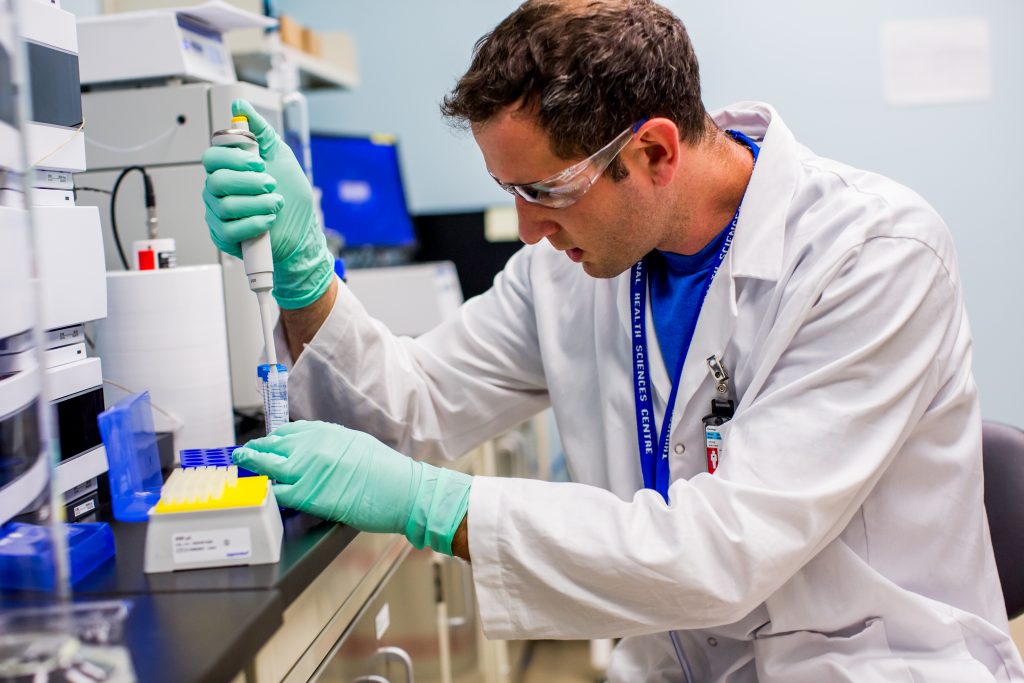Inaugural Research Day Focuses on Smart Health
by Marcello Bernardo
 The inaugural Research Day is happening on September 6th, 2018 at Thunder Bay Regional Health Sciences Centre.
The inaugural Research Day is happening on September 6th, 2018 at Thunder Bay Regional Health Sciences Centre.Thunder Bay Regional Health Sciences Centre (the Hospital) and its research arm, the Thunder Bay Regional Health Research Institute, are teaming up to host their first ‘Research Day’ on September 6, 2018.
This full day event is designed to share information, build skills and raise interest in health research, and showcase our scientists and their work.
Research Day will provide an amazing networking opportunity and will be open to all staff at the Hospital and Health Research Institute as well as physicians, health practitioners, staff of our partner organizations and to interested members of the public.
Highlights of this event will include a special keynote presentation from Dror Ben-Zeev, PhD (‘Mobile e-Mental Health Research’), a panel discussion (‘Remote Access Health Technology Research & Development’), presentations by our top scientists, poster displays, workshops and guided tours of the Hospital’s research areas including the 3T-MRI, Wet Lab, and Cyclotron (virtual tour).
Our theme this year is ‘A Focus on Smart Health’ and how technology is becoming more and more a driver of health care.
“Technology can assist in overcoming several of Northwestern Ontario’s geographical and cultural barriers to care,” said Jean Bartkowiak, President and CEO of the Hospital and CEO of the Health Research Institute. “It can help us streamline and improve access to care so that we are able to provide the right care to the right person at the right time, no matter where they live in the region.”
That’s where “smart health” comes in. Smart health is an umbrella term for connected and interconnected health solutions for diagnosing, monitoring, treating, and advising patients. It uses technologies such as smart phone apps, internet, and even video technology in innovative ways to overcome those barriers and improve patient care.
The Health Research Institute is currently exploring how smart health technology can bring smart health solutions to the region and to achieve the objectives of the Hospital’s Strategic Plan 2020, while we progress with the three Strategic Directions of our Health Research Institute’s Strategic Plan:
Healthier
Indigenous health has been identified as one of the Hospital’s five key directions and is one of the directions in the Health Research Institute’s 2020 Strategic Plan. The Health Research Institute will be working with Hospital staff and others to engage Indigenous leaders and communities to learn more about the communities that we serve and their health needs. Our goal is to research and develop programs and services that can be adapted to each community need and capacity. Smart health can help us reach that goal, providing opportunities to overcome the specific geographical, cultural, language, and other barriers to care.
Wealthier
The Health Research Institute was founded on the understanding that homegrown solutions work best for a unique region such as Northwestern Ontario. Health care delivery here faces a specific set of challenges like no other in the world. Our scientists and researchers generate research funding that supports homegrown projects. One example is the joint project between Dr. Naana Jumah and Dr. Chris Mushquash that will help develop pre-natal services for Indigenous mothers and increased health education for Indigenous high school students in Thunder Bay. That financial support speaks volumes to the quality of our researchers, and how well respected they are in their fields.
Smarter
One of our first steps in 2018 is to hire a smart health technology scientist at the Research Institute with a joint appointment at Lakehead University. Many digital tools can enhance distance health and indeed most areas of health care – perhaps an overwhelming number of tools. We need someone who can determine the best tools for us and our partners in health, and investigate how we can use smart health technologies such as apps, sensors, and other software-based solutions.
It’s early days for smart health technology, but we plan to implement new technology over the next several years that will significantly improve patient care at our Hospital and in the region, keeping patients closer to home. Our new venture into smart health relies on other research programs as well as academic, clinical, and community affliates. We are looking to partner with Mohawk College in Hamilton and their mHealth & eHealth Development and Innovation Centre (MEDIC) – which is itself a partnership with McMaster University – to assist us in finding the right digital health solutions. This will allow us to share resources and be able to focus on how the technology will be able to improve health care delivery in Northwestern Ontario rather than start using the technology from scratch.
Our Clinical Trials program is expanding its partnerships with pharmaceutical companies, device makers, and software developers to provide new options for our patients. This year, the Council of Academic Hospitals of Ontario (CAHO), of which the Thunder Bay Regional Health Sciences Centre is a member, was selected by the Ministry of Health and Long-Term Care as an Innovation Broker. This initiative allows partner hospitals to connect with tech vendors to bring new patient care advances to the bedside faster.
These partnerships will support the Hospital’s Strategic Plan 2020 and will assist the Health Research Institute to meet its 2020 Strategic Plan Directions of becoming Healthier, Wealthier, and Smarter.
To learn more about what to expect on Research Day, visit www.tbrhri.ca/research-day.